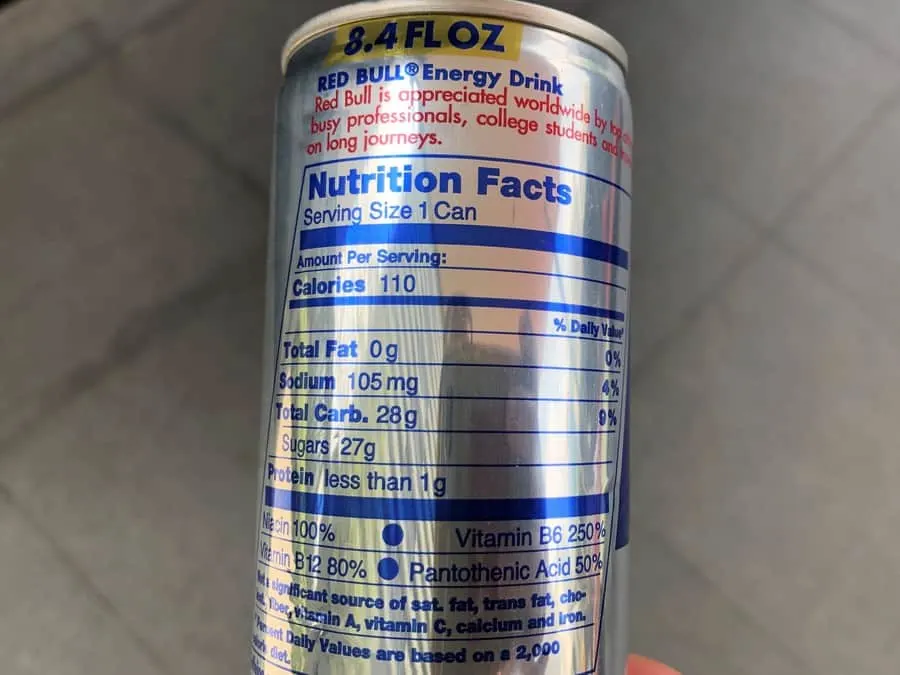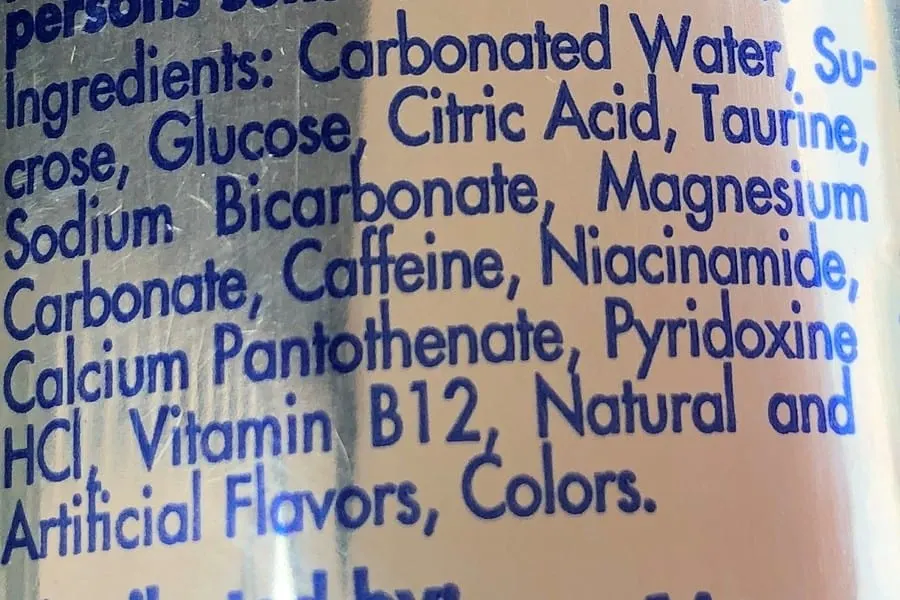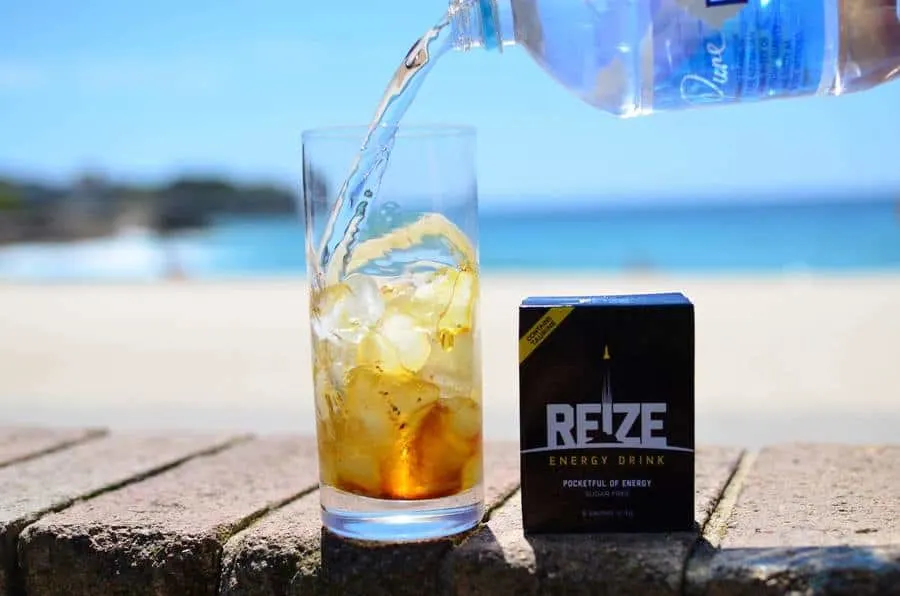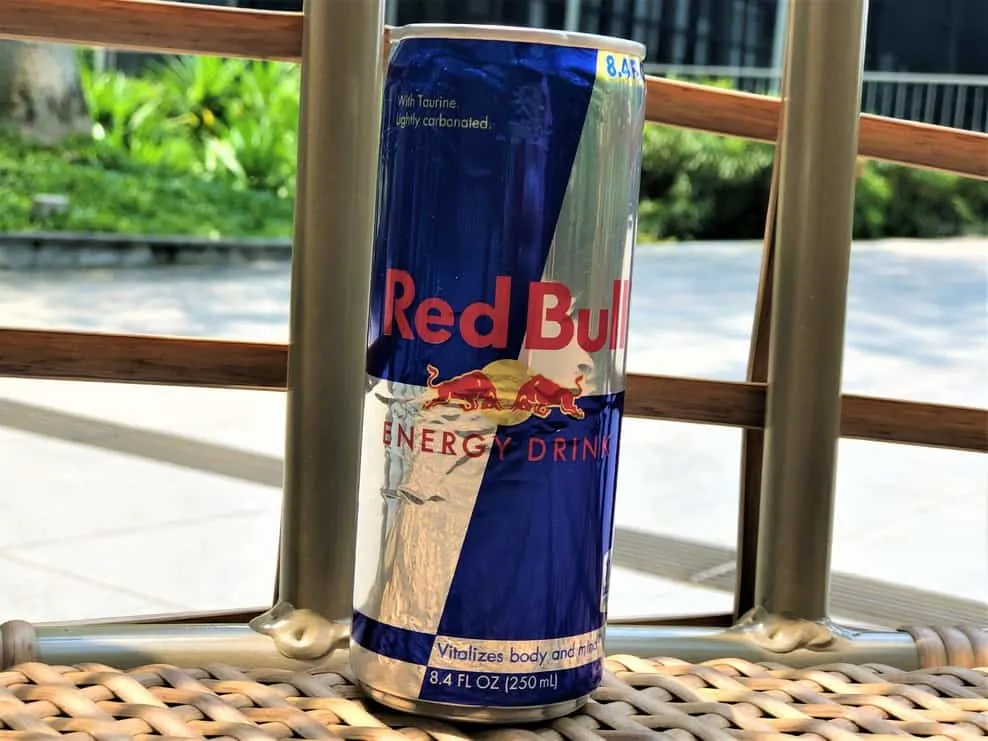If you need a dose of energy, nothing quite compares to a good ol’ can of Red Bull, which has become synonymous with energy drinks at this point.
But what exactly do you get out of a can of Red Bull? And just how nutritionally viable is it for you to have one?
For the short answer, a usual 8.4 fl.oz can of Red Bull has 110 calories, 27g of sugar, and 80mg of caffeine in it, along with a handful of sodium, 1g of taurine, and various B-Vitamins.
For a deeper dive into the nutritional value of a can of Red Bull and how it affects you nutritionally, stick around…
Red Bull Nutrition Label
First up, here’s a look at the nutrition label on the back of a Red Bull can so we can get a rough idea of what we’re working with.
| Typical Values | Red Bull (8.4 fl.oz) |
| Energy | 110 calories |
| Fat (Of which Saturated) | 0g (0g) |
| Carbohydrate (Of which Sugars) | 28g (27g) |
| Caffeine | 80mg |
| Sodium | 105mg |
| Vitamin B3 (Niacin) | 22mg |
| Vitamin B5 (Pantothenic Acid) | 5.05mg |
| Vitamin B6 | 5.05mg |
| Vitamin B12 | 5.1µg |

Red Bull Calories
A regular 8.4 fl.oz can of Red Bull has 110 calories, which is a fairly moderate amount of calories for any energy drink to have.
If you’re looking for an energy drink with a low-calorie count, Red Bull probably isn’t going to fit into that particular niche.
Although not as high as a 16 fl.oz can of Monster with 210 calories, it’s still a fairly considerable amount of calories to add to your diet, especially considering that a Red Bull can is fairly small.
Given that the average adult usually needs around 2000 to 2500 calories per day (give or take metabolism and lifestyle variances), a can of Red Bull on occasion shouldn’t affect your diet too much.
That being said, having more than one can a day does mean that those small number of calories will start piling up pretty quickly, so be sure not to consistently have too many cans a day if you’re on a diet.
Red Bull may supply some usable calories, but if you’re feeling hungry, a meal is usually preferable since it has a wider variety of nutrients.
Whatever you do, don’t go overboard on those Red Bull cans, watch your calorie consumption, and never replace a meal with an energy drink.
Red Bull Ingredients
Red Bull’s ingredients are pretty tame compared to most other energy drinks these days, but they work just fine. Here are the ingredients in an easy-to-read list:
- Carbonated Water
- Sucrose
- Glucose
- Citric Acid
- Taurine
- Sodium Bicarbonate
- Magnesium Carbonate
- Caffeine
- Niacinamide
- Calcium Pantothenate
- Pyridoxine HCl
- Vitamin B12
- Natural and Artificial Flavors
- Colorings

How Much Caffeine Is In Red Bull?
A regular serving of Red Bull has 80mg of caffeine per 8.4 fl.oz can, which is a fairly small amount.
Caffeine plays a big part in why you drink energy drinks, considering that it helps to keep you awake as well as improve cognition, and exercise performance.
As energy drinks can reach up to 300mg of caffeine per serving, a can of Red Bull is considerably milder than your average energy drink. In fact, it’s about equal to your regular cup of coffee (95mg per serving).
Personally, I prefer my energy drinks to have somewhere between 50mg to 100mg of caffeine per serving, which I find to be just the right amount for a quick boost, but not too much I might feel ill afterward.
At 80mg of caffeine, Red Bull slots right into that sweet spot, and I definitely wouldn’t mind having one to wake me up from a post-lunch crash.
Of course, depending on your own caffeine metabolism and how sensitive you are to caffeine, you might need a couple of cans before you really start to feel the caffeine kick-in.
However, it’s best to keep your caffeine consumption to a tolerable level. The FDA recommends that you have no more than 400mg of caffeine per day, as any more may lead to notable side effects, such as:
- Insomnia
- Restlessness
- Headaches
- Stomachaches
- Dizziness
- Dehydration
- Anxiety
In any case, be sure to keep your caffeine intake to a tolerable personal limit, and try not to double down on energy drinks and other caffeinated beverages such as coffee, tea, or soda.
How Much Sugar Is In Red Bull?
Each 8.4 fl.oz can of Red Bull has 27g of sugar, which is a pretty average amount for a sugary energy drink of its size.
Although it isn’t exactly as healthy as a zero-calorie or low-sugar energy drink, 27g of sugar isn’t an especially excessive amount for an energy drink.
In any case, the AHA advises that the maximum daily sugar intake for men and women are 36g, and 25g respectively, so a can of Red Bull won’t be too detrimental to your health if consumed in moderation.
While having sugar in small doses is fine as a treat, and a mood booster, having too much sugar over a long period of time can lead to some serious health issues, the main one being the onset of metabolic syndrome.
Having a diet fairly high in sugar can lead to some serious issues in the long run, most notably:
- Weight Gain
- Type II Diabetes
- Increased risk of heart disease
- Acne
- Increased risk of depression
Furthermore, you’re a lot more susceptible to a sugar crash with a sugary energy drink, which isn’t great if you plan on working for a bit longer.
As with most things in life, you can definitely have too much of a good thing, so keep your Red Bull consumption to a healthy level, and be sure not to have too many sugary foods along the way.
If you’re not too fond of sugar, Red Bull also offers a sugar-free version for your enjoyment, and check out the article I’ve written on the best energy drinks with less sugar for some great alternatives.
Other Ingredients In Red Bull
Taurine
Taurine is an amino acid that’s noted to have a host of benefits, making it a widely used ingredient in energy drinks.
Taurine is practically synonymous with Red Bull, especially considering the circulating rumor that their taurine content is derived from bull semen.
Rest assured, the taurine content in Red Bull is fully synthetic, so you don’t have to worry about that at all.
As for the potential benefits of taurine, the list includes:
- Promoting healthy metabolism
- Improving exercise performance
- Protecting the muscles
While these benefits are definitely interesting, the science doesn’t really confirm that there are any immediate benefits from including taurine in your diet, so take these claims with a healthy serving of salt.
B-Vitamins
From converting energy to forming cells, B-Vitamins are an energy drink staple, so it’s not surprising that they’re in Red Bull, as well.
Have a look at the table below for more details on the B-Vitamin content present in Red Bull, and click on the link here to find out more about B-Vitamins in general.
Purpose | Red Bull (8.4 fl. oz) | Tolerable Upper Intake Level | |
| Vitamin B3 (Niacin) | helps the body release energy | 22mg | 35mg |
| Vitamin B5 (Pantothenic Acid) | convert food into energy | 5.05mg | N/A |
| Vitamin B6 | store energy from protein and carbohydrates | 5.05mg | 100mg |
| Vitamin B12 | release energy from food | 5.1µg | N/A |
Red Bull Energy Drink Benefits

Apart from keeping you awake through rough mornings or late nights, Red Bull has a positive effect on cognitive performance, as well as improving reaction times.
Whether you’re having a gaming session, struggling through a 9 am class, or driving late into the night, Red Bull’s ability to keep you fairly awake is definitely beneficial for the moment.
Red Bull may not be excellent for your health due to its high sugar content, but it serves its intended purpose by helping you stay up and energized for the duration of your work or study session.
Just be sure not to have too many Red Bulls in a single day; having too much caffeine and sugar at any given point is definitely a bad idea.
Is Red Bull Alcoholic?
Although pretty commonly used as a mixer for other alcoholic beverages, Red Bull by itself is definitely a non-alcoholic beverage.
As you can tell from the nutritional label or a quick search on Google, Red Bull doesn’t contain any alcohol nor any specific effect that can be distinctly classified as being alcohol-induced either.
That being said, mixing alcohol and energy drinks together is a really bad idea as caffeine can warp your perception of how drunk you are, which can lead to serious injuries.
Is Red Bull Worse Than Coffee?

Given that they’re both caffeinated beverages that often have a bit more sugar than necessary, a can of Red Bull should be no much worse than a cup of coffee and in truth, they both affect you in very similar ways.
As a lot of factors go into determining if coffee is better or worse than energy drinks, given the varying caffeine content, cream, and sugar, it’s hard to come up with a single, catch-all answer.
Coffee comes with a bunch of antioxidants and is almost calorie-free (unless you start adding in toppings or sugar, which will definitely raise the calorie count)
Red Bull, while lacking antioxidants, does have B-Vitamins, which is something coffee doesn’t.
All-in-all, it’s not really a matter of which is better, but more of personal preference, as it really doesn’t matter how you get your caffeine in the end as long as you find it enjoyable.
For a closer look at the ongoing debate of coffee vs energy drinks, check out this article where I cover everything you need to know.
Is Red Bull Bad For Your Health?
As long as you’re healthy, and only have them in moderation, having a can of Red Bull every now and then shouldn’t be detrimental to your health.
Given the low caffeine and average sugar count, Red Bull is definitely not the unhealthiest energy drink that you could be having, especially since it comes in a relatively small size.
But if you’re keen on avoiding any side effects from Red Bull, the most important thing is to keep your caffeine and sugar in check, along with making sure that you’re only having a can of Red Bull only when you really need it.
In any case, so long as you have a relatively healthy lifestyle and a balanced diet, Red Bull’s effects are pretty limited to its sweet taste and energy-boosting capabilities.
Red Bull Flavors
While Red Bull is mostly known in its original format and flavor, they do have a variety of fruity variants for you to try out, here are some below:
- Watermelon
- Peach
- Blueberry
- Kiwi-Apple
- Coconut & Berry
- Pear
- Cranberry
- Orange and
- Tropical Fruits.
Red Bull Energy Drink Alternatives
If you aren’t completely sold on Red Bull, here’s a list of some alternative energy drinks that might serve you well if you’re interested in trying something new:
- Celsius
- Bang
- Rockstar
- Reign
- 5 Hour Energy
- Guru
- Rockstar
- Monster
- NOS Energy
- Full Throttle
- Adrenaline Shoc
- Raze Energy
- C4 Energy
- Game Fuel
Why not have a look at powdered energy drinks as well? They’re easy to prepare, more affordable and you can make each serving to your own preferences:
- G-Fuel
- ZipFizz
- Advocare Spark
- REIZE (my fav)
REIZE (10 out of 10)

If you want something a bit lighter than Red Bull, how about trying REIZE Energy Drink?
REIZE is an awesome powdered energy drink that comes in convenient 4g sachets. With a sensible 50mg of caffeine, REIZE is completely sugar-free and has just 11 calories per serving.
REIZE also contains a smart blend of taurine, ginseng, and B-group vitamins, giving you the perfect energy boost without the crash afterward.
Best of all, REIZE ships straight to your door for only about $1 per drink, which is amazing value for money.
Try REIZE today and I’m sure you’ll agree it’s a smarter choice than Red Bull.
Other Articles:
- Red Bull Energy Drink Review
- Is Red Bull Vegan?
- Is Red Bull Actually Bad For You?
- How Many Red Bulls Can You Have a Day?
Have other questions about Red Bull?
I’ve put together this epic Red Bull resource directory where you’ll find everything you could ever want to know about Red Bull energy drink.

